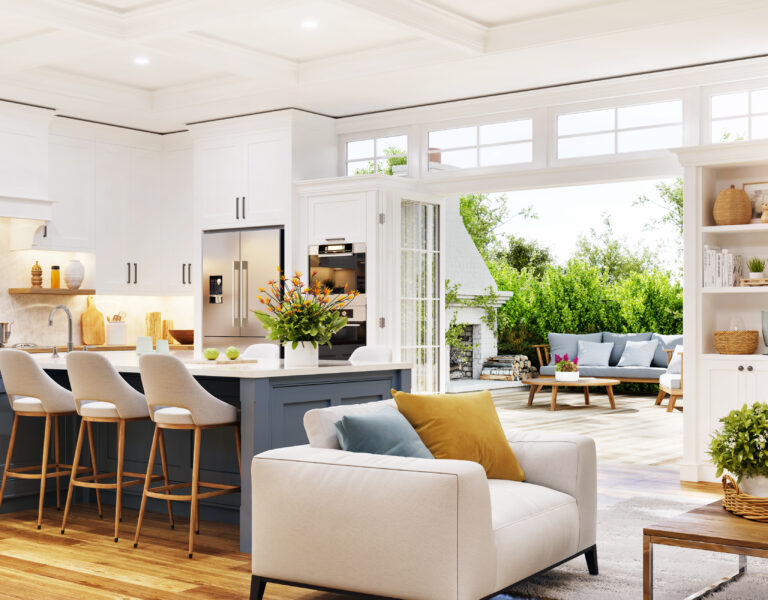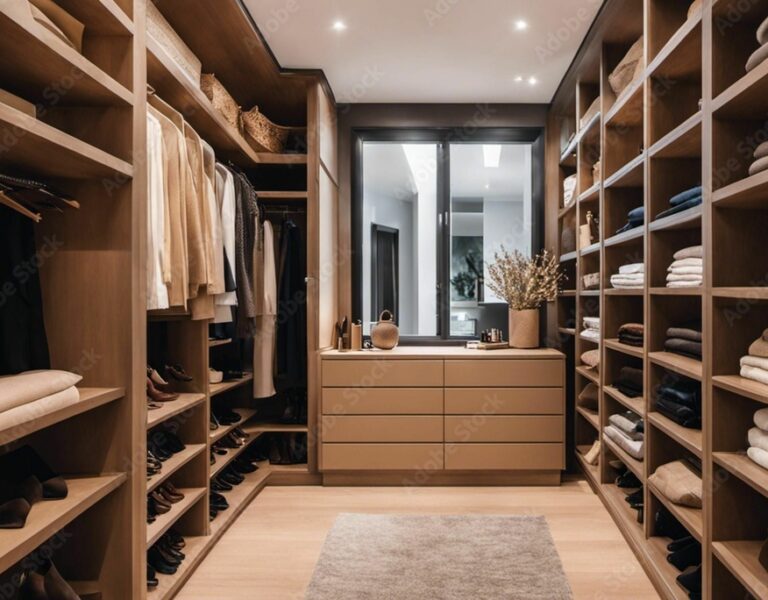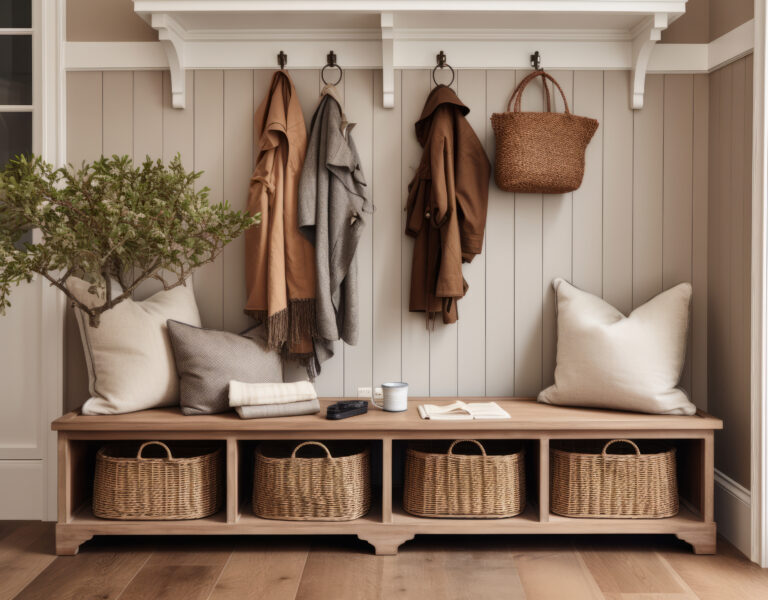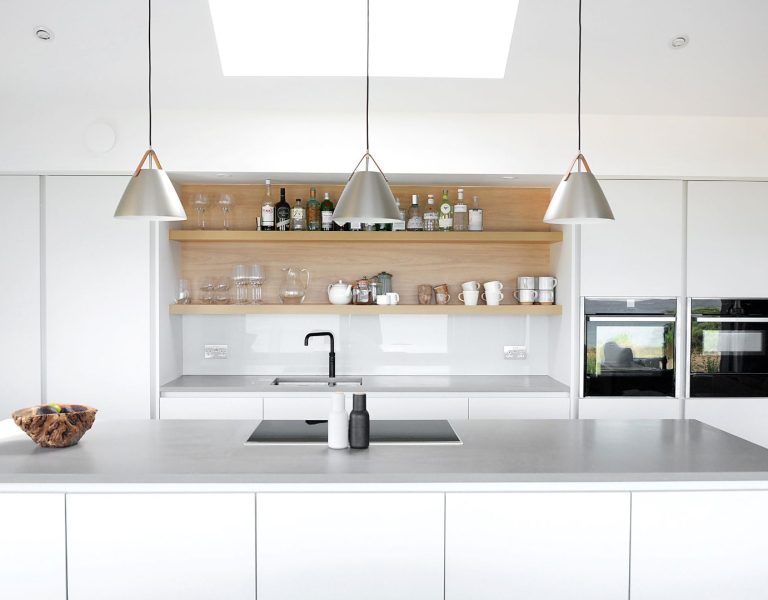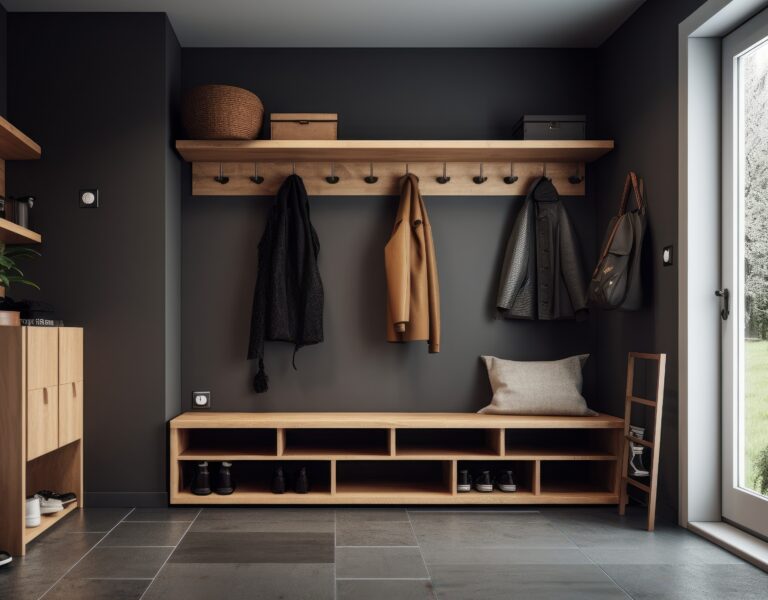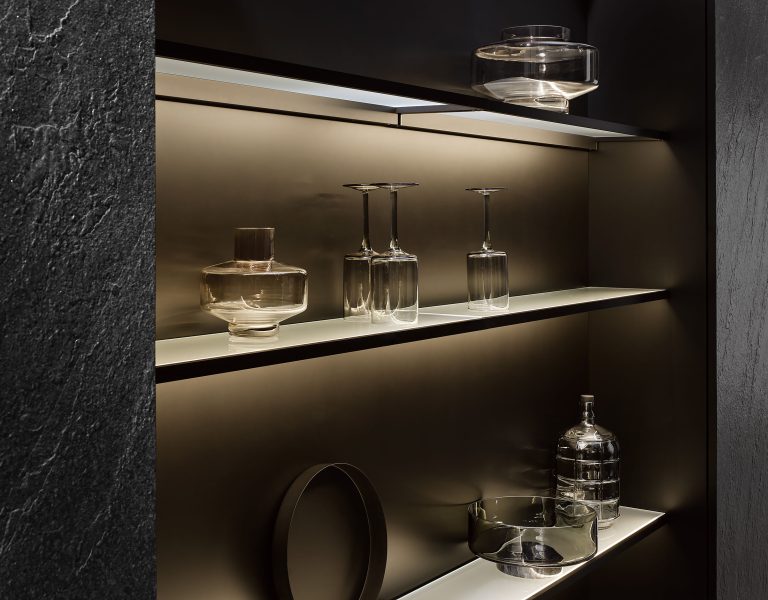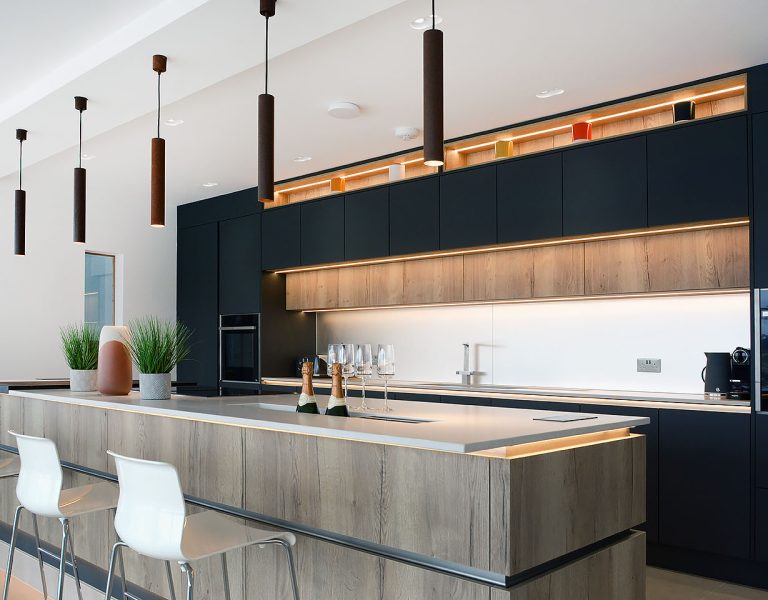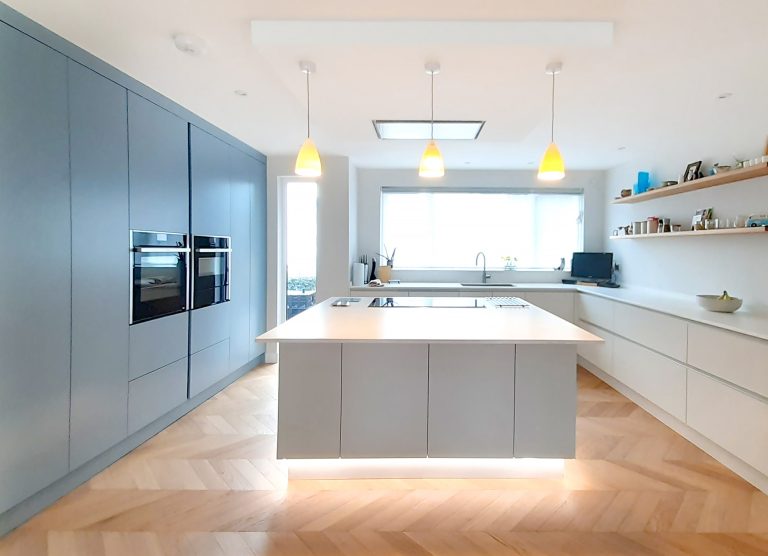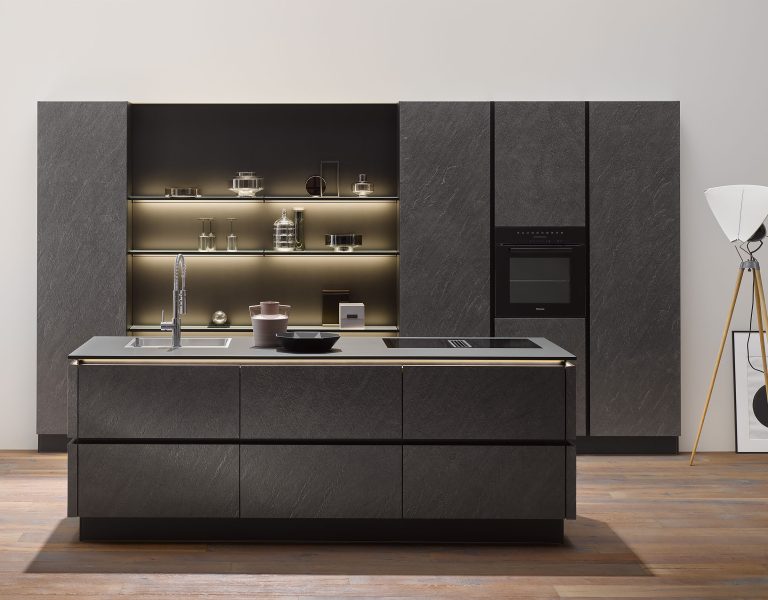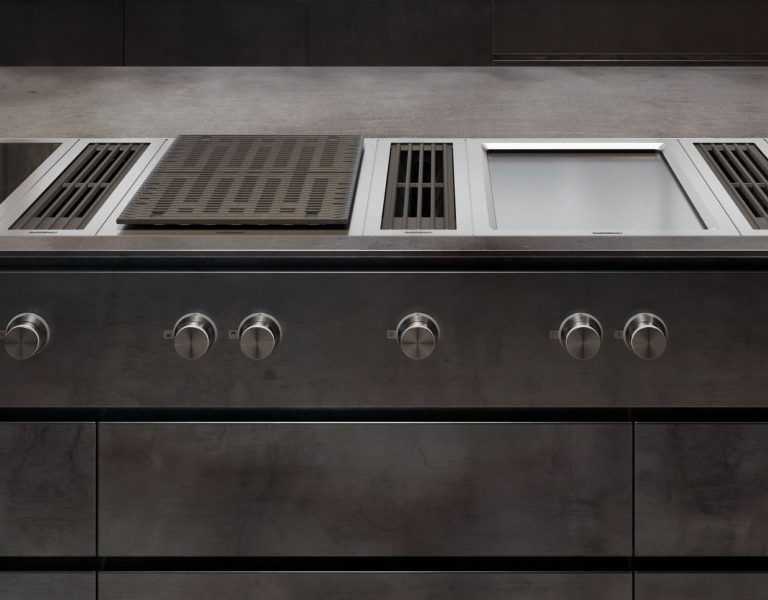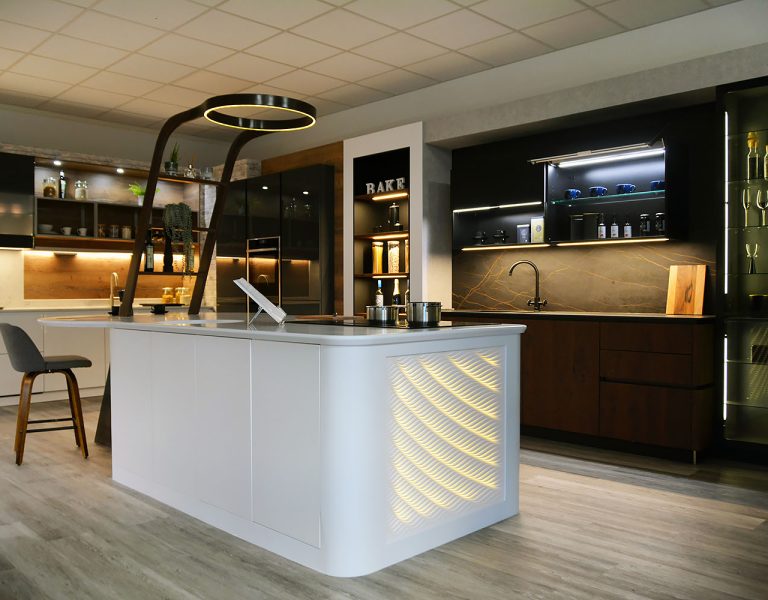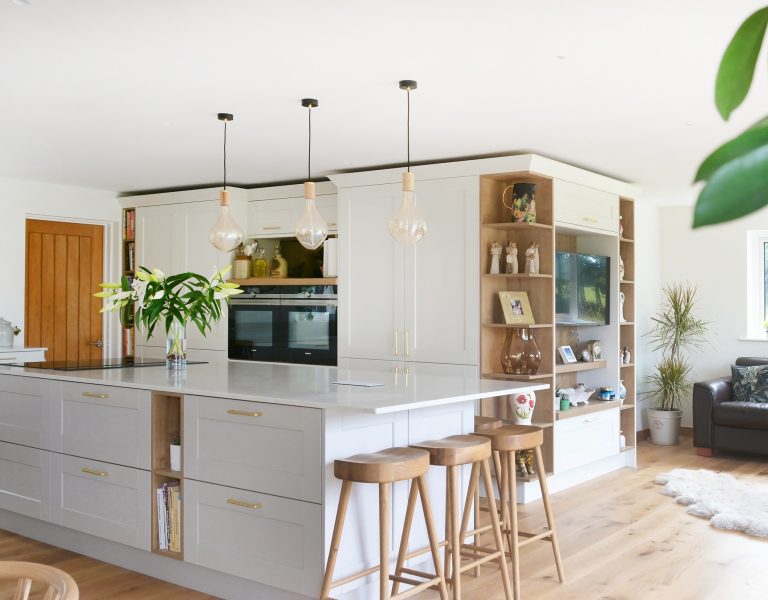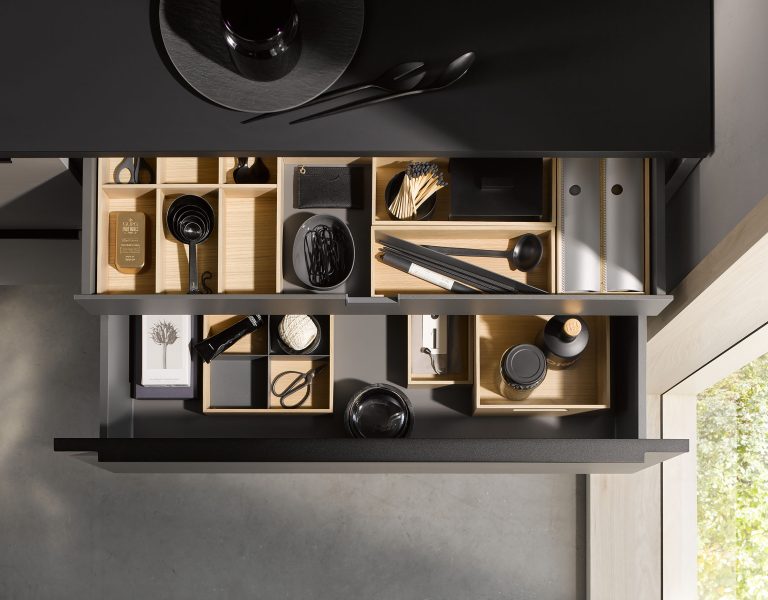Sustainable Kitchens: Transform Your Kitchen with Eco-Friendly Design
Are you looking for sustainable kitchen inspiration for your next eco-friendly kitchen project? At Now Kitchens, we actively support and promote sustainability, and that’s why it’s important for us to make environmentally aware and sustainable choices whenever possible. In this article we will explore innovative and eco-friendly kitchen design ideas that will transform your kitchen into an environmentally conscious haven. From energy-efficient appliances to upcycled cabinets and countertops, you can rest assured knowing Now Kitchens share the same sustainable ethos as you.
By incorporating sustainable materials and designs into your new sustainable kitchen, not only will you be reducing your carbon footprint, but you will also create a healthier space for you and your family. Say goodbye to harmful chemicals and hello to non-toxic, eco-friendly paints and finishes.
We will also delve into the world of smart technology, showing you how to integrate it seamlessly into your kitchen for maximum efficiency and convenience. From smart lighting systems that adjust according to natural light to water-efficient faucets that help conserve precious resources, you will discover a plethora of sustainable options.
So, if you are ready to embark on a journey towards a more sustainable kitchen, keep reading and let us guide you through the exciting world of sustainable kitchen design ideas.
The importance of sustainable kitchens
Creating a sustainable kitchen goes beyond just having an eco-friendly design. It is about making conscious choices that have a positive impact on the environment and your well-being. The design process when looking at sustainable kitchens takes into consideration the materials used, energy consumption, waste management, and overall functionality. By prioritising sustainability in your kitchen, you contribute to a healthier planet and create a space that promotes a sustainable lifestyle.
One of the key benefits of sustainable kitchens is the reduction of environmental impact. By choosing eco-friendly materials, such as responsibly sourced timber and recycled glass, for your countertops and cabinetry, you minimise the extraction of natural resources and reduce the amount of waste generated. Additionally, energy-efficient appliances and water-saving fixtures help conserve valuable resources, such as electricity and water, while reducing your utility bills. Sustainable kitchen design also promotes better indoor air quality by using non-toxic paints and finishes, which is crucial for your family’s health.
In the following sections, we will explore various design ideas for sustainable kitchens, ranging from green materials to energy-efficient appliances and smart technologies, all aimed at creating an eco-friendly kitchen for your home.
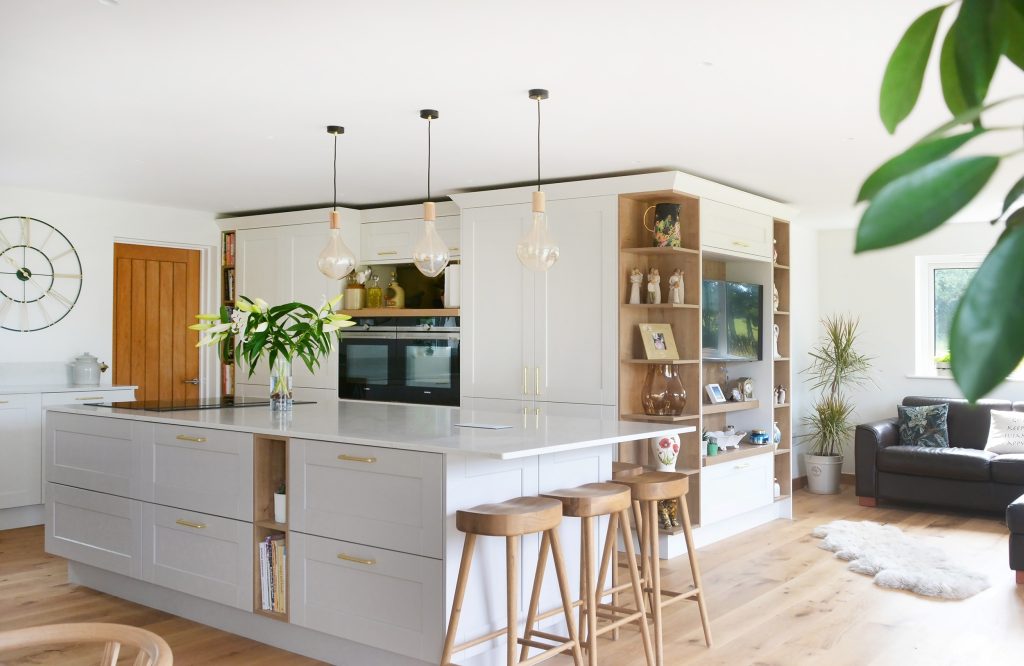
Benefits of sustainable kitchen design
When it comes to sustainable kitchens, there are several design trends that have gained popularity in recent years. These trends not only focus on reducing environmental impact but also add a touch of style and elegance to your kitchen.
One of the top trends when designing sustainable kitchens is the use of recycled and reclaimed materials. Incorporating reclaimed or responsibly sourced wood for your cabinets and worktops not only gives your kitchen a unique look but also reduces the demand for new timber, thus preserving forests. Both our British and German kitchen suppliers use Eggerboard products for their doors and cabinets. Eggerboard wood comes from 100 % verified legal and controlled sources, and the company supports several international reforestation projects. Recycled glass is another popular choice for countertops, as it adds a modern and sleek element while minimising waste. Take Silestone as an example; a popular worktop choice for many sustainable projects. The manufacturer uses 99% recycled water in their production process and their 19 Silestone® colours (Hybriq+) and 25 Dekton® colours are made with at least 20% recovered recycled glass and minerals.
What’s trending in the world of Sustainable Kitchens?
Another trend in sustainable kitchen design is the use of energy-efficient appliances. Energy Star certified appliances, such as refrigerators, dishwashers, and ovens, are designed to consume less energy while maintaining high performance. These appliances not only help reduce your carbon footprint but also save you money on your energy bills. Leading appliance specialists such as Gaggenau have had environmental awareness anchored in its DNA for over three centuries and deals with the subject as conscientiously and elegantly as it does with its products.
To create a truly sustainable kitchen, it is also essential to consider water-saving fixtures and technologies. Installing low-flow faucets and showerheads can significantly reduce water consumption without compromising functionality. Additionally, smart technologies, such as sensor-activated faucets and water-efficient dishwashers, provide further opportunities for water conservation.
 Sustainable kitchens and the latest design trends
Sustainable kitchens and the latest design trends
When it comes to sustainable kitchen design, the choice of materials for countertops and cabinetry plays a crucial role. Opting for green materials or working with suppliers that use greener processes, not only helps reduce environmental impact but also adds a unique and stylish touch to your kitchen.
One popular choice for countertops as mentioned above is Silestone by Consentino. Thanks to its HybriQ and HybriQ+ technologies, Consentino are now leading the way in sustainability in the space that has become the epicentre of our homes. Silestone consists of a hybrid formulation of mineral raw materials such as quartz and recycled materials making it an excellent choice for kitchen worktop surfaces. Whilst producing no particle emissions and zero waste water, its production is carried out using 99% recycled water and 100% renewable energy. Another green material option is recycled glass. 19 Silestone® colours (Hybriq+) and 25 Dekton® colours are also made with at least 20% recovered recycled glass and minerals making it a firm favourite in sustainable kitchens.
For cabinetry, responsibly sourced wood from suppliers that use Eggerboard for their doors and cabinetry is a sustainable and visually appealing choice. Both our British and German kitchen suppliers use Eggerboard wood, which comes from 100% legal and verified sources. The company also supports several international reforestation projects and are certified green and sustainable by the Composite Panel Association’s Eco-Certified Composite standard. By creating your sustainable kitchen dream with the help of our sustainable manufacturers and suppliers, you not only reduce deforestation but also create a durable, warm and inviting atmosphere in your kitchen.
Sustainable kitchen materials for kitchen countertops and cabinetry
When it comes to creating an eco-friendly kitchen, choosing energy-efficient appliances by Gaggenau, Siemens and NEFF is a must. Energy-efficient appliances not only help reduce your carbon footprint but also save you money on your energy bills in the long run.
One of the key appliances to consider is the refrigerator. Look for Energy Star certified refrigerators that are designed to consume less energy without compromising performance. These refrigerators often come with advanced features, such as improved insulation and temperature control, which help reduce energy consumption.
Another energy-intensive appliance in the kitchen is the dishwasher. Opt for a dishwasher with an Energy Star label, as it uses less water and energy compared to conventional models. Additionally, look for dishwashers with smart features, such as soil sensors and delay start options, which help optimise energy usage.
When it comes to cooking, induction cooktops are a sustainable choice. Induction cooktops use electromagnetic fields to heat the cookware directly, resulting in faster and more efficient cooking. They are also safer and more precise than traditional gas or electric cooktops.
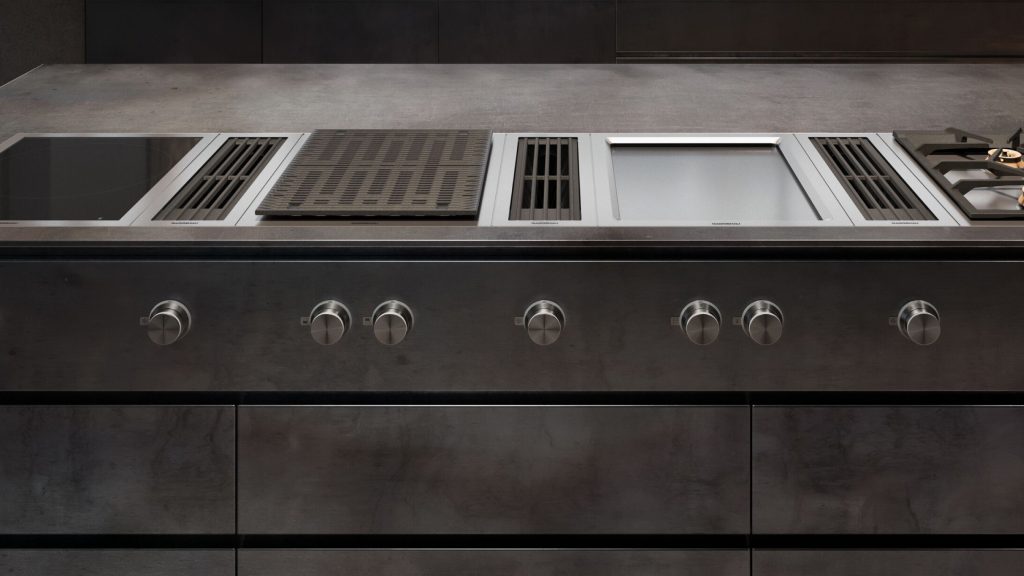
Energy-efficient appliances for more sustainable kitchens
Conserving water in the kitchen is not only beneficial for the environment but also helps reduce your water bills. By incorporating water-saving fixtures and technologies, you can significantly reduce water consumption without sacrificing functionality.
One of the simplest ways to save water in the kitchen is by installing low-flow faucets. These faucets are designed to deliver a steady stream of water while using less water compared to conventional faucets. Additionally, consider installing a faucet with a sensor, as it automatically turns off the water when not in use, preventing unnecessary wastage.
Another water-saving technology to consider is a smart dishwasher. Smart dishwashers often come with water-efficient features, such as soil sensors that detect the level of dirtiness and adjust the water usage accordingly. Additionally, they often have delay start options, allowing you to run the dishwasher during off-peak hours when water demand is lower.
Water-saving fixtures and technologies for sustainable kitchens
Incorporating natural lighting and ventilation into your kitchen is not only an eco-friendly choice but also enhances the overall ambiance and functionality of the space.
Maximising natural light in your kitchen can be achieved through various means. Start by positioning your kitchen windows strategically to allow for ample sunlight to enter the space. Consider using light-coloured curtains or blinds that allow light to pass through while maintaining privacy. Additionally, installing skylights or light tubes can bring in additional natural light, especially in areas with limited window options.
In terms of ventilation, consider installing a highly efficient extraction system by leading suppliers such as Gaggenau, NEFF and Siemens, to remove cooking odours and pollutants from the air. Opt for an extraction system with an energy-efficient fan and filters that can be easily cleaned or replaced. Additionally, consider installing windows or vents that allow for natural airflow, reducing the need for artificial cooling and ventilation.

Natural lighting and ventilation in sustainable kitchen design
Bringing nature into your kitchen not only adds a touch of freshness and beauty but also promotes a healthier and more sustainable environment. Indoor plants not only purify the air but also reduce stress and improve overall well-being.
When choosing indoor plants for your kitchen, opt for varieties that thrive in low-light conditions and can withstand the heat and humidity often associated with cooking. Some popular choices include pothos, snake plants, and spider plants. Additionally, consider installing a vertical garden or herb wall, allowing you to grow fresh herbs and greens right in your kitchen.
Incorporating biophilic design principles into your kitchen goes beyond just adding plants. It involves creating a connection with nature through the use of natural materials, textures, and colours. Consider using natural wood finishes, stone countertops, and earthy colour palettes to create a sense of harmony and serenity in your kitchen.
Sustainable kitchens should incorporate Indoor plants and biophilic design
Proper recycling and waste management are vital components when it comes to designing sustainable kitchens. By implementing effective recycling and waste management systems, you can reduce landfill waste and promote recycling and composting.
Start by designating separate bins for recyclables, such as glass, plastic, and paper. Make sure these bins are easily accessible and clearly labelled to encourage proper sorting. Additionally, consider installing a compost bin for food scraps and organic waste. Composting not only reduces waste but also creates nutrient-rich soil for your garden.
When it comes to waste management, consider investing in a quality garbage disposal system. Look for models that are energy-efficient and capable of grinding food waste into fine particles, which can be easily processed by wastewater treatment plants. Additionally, consider using eco-friendly garbage bags made from biodegradable materials to further reduce environmental impact.
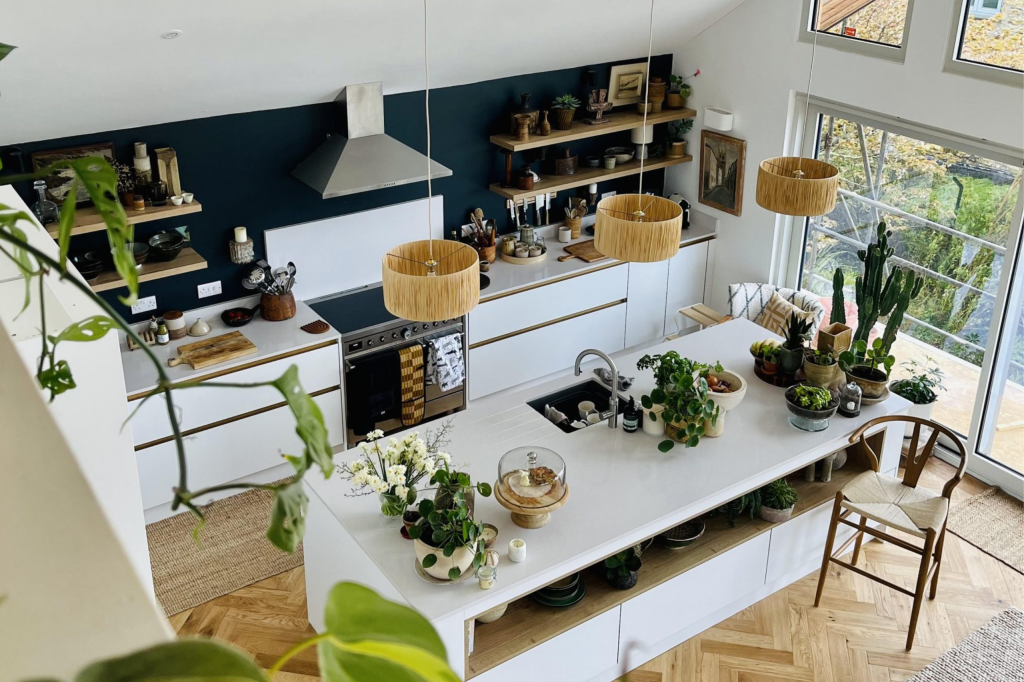
Recycling and waste management for sustainable kitchens
Transforming your kitchen into an eco-oasis is an exciting journey that combines style, functionality, and sustainability. By incorporating sustainable materials, energy-efficient appliances, water-saving fixtures, and smart technologies, you can create a kitchen that not only reduces your environmental impact but also enhances your overall well-being.
Remember to choose green materials for your countertops and cabinetry so you can focus your attention on adding your own unique and stylish touches to your kitchen. Opt for energy-efficient appliances, such as refrigerators and dishwashers with Energy Star certification, to save energy and reduce utility bills. Consider installing water-saving fixtures, such as low-flow faucets and smart dishwashers, to conserve water without compromising functionality.
Incorporating natural lighting, ventilation, and indoor plants into your kitchen promotes a healthier and more sustainable environment. Embrace biophilic design principles by using natural materials and earthy colour palettes to create a sense of harmony and serenity.
Lastly, implement effective recycling and waste management systems, such as separate bins for recyclables and a composting system, to reduce landfill waste and promote a circular economy.
By following these sustainable design ideas, you can transform your kitchen into an eco-oasis that not only looks beautiful but also contributes to a greener and healthier future. So, go ahead, take the leap, and talk to us about sustainable kitchens today!

